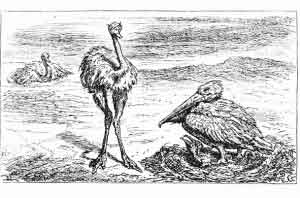An Ostrich, which leaves its eggs to nature, chided a Pelican for feeding her own with blood. Pelican responded that children are the highest calling.
Raising children is the best job in the world.

JBR Collection
The Ostrich one day met the Pelican, and observing her breast all bloody, “Good gracious!” said she to her; “what is the matter? What accident has befallen you? You have certainly been seized by some savage beast of prey, and have with difficulty escaped from his merciless claws.” “Do not be surprised, friend,” replied the Pelican; “no such accident, nor, indeed, anything more than common has happened to me. I have only been engaged in my ordinary employment of tending my nest, of feeding my dear little ones, and nourishing them with the vital blood from my bosom.” “Your answer,” returned the Ostrich,” astonishes me still more than the horrid figure you make. What! is this your practice, to tear your own flesh, to spill your own blood, and to sacrifice yourself in this cruel manner to the importunate cravmgs of your young ones? I know not which to pity most, your misery or your folly. Be advised by me; have some regard for yourself, and leave off this barbarous custom of mangling your own body; as for your children, commit them to the care of Providence, and make yourself quite easy about them. My example may be of use to you. I lay my eggs upon the ground, and just cover them over lightly with sand; if they have the good luck to escape being crushed by the tread of man or beast, the warmth of the sun broods upon and hatches them; and in due time my young ones come forth. I leave them to be nursed by nature, and fostered by the elements. I give myself no trouble about them, and I neither know nor care what becomes of them.” “Unhappy wretch,” says the Pelican, “who art hardened against thy offspring, and through want of natural affection renderest thy travail fruitless to thyself–who knowest not the sweets of a parent’s anxiety, the tender delight of a mother’s sufferings–it is not I, but thou, that art cruel to thy own flesh. Thy insensibility may exempt thee from a temporary inconvenience, and an inconsiderable pain; but at the same time it makes thee inattentive to a most necessary duty, and incapable of relishing the pleasure that attends it–a pleasure, the most exquisite of all with which Nature has indulged us; in which pain itself is swallowed up and lost, or only serves to heighten the enjoyment.”
